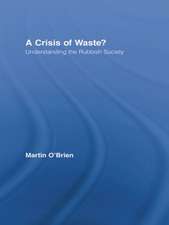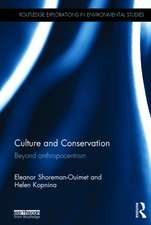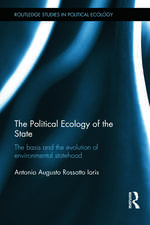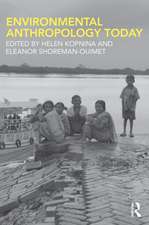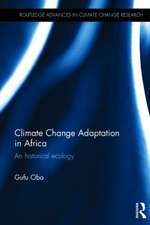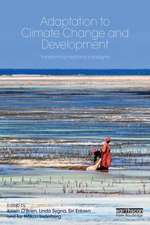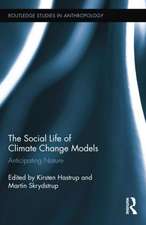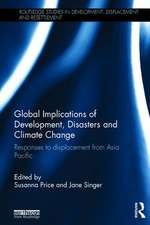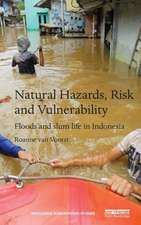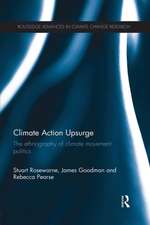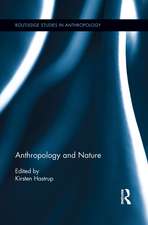Water Politics and Spiritual Ecology: Custom, environmental governance and development: Routledge Explorations in Environmental Studies
Autor Lisa Palmeren Limba Engleză Hardback – 11 mai 2015
The culmination of a decade of ethnographic research in Timor Leste, this book gives a critical account of the complex social and ecological specificities of a water-focused society in one of the world’s newest nations. Comparatively framed by international examples from Asia, South America and Africa that reveal the need to incorporate and foreground cultural diversity in water governance, it provides deep insight into the global challenge of combining customary and modern water governance regimes. In doing so it addresses a need for sustained critical ecological inquiry into the social issues of water governance.
Focusing on the eastern region of Timor Leste, the book explores local uses, beliefs and rituals associated with water. It identifies the ritual ecological practices, contexts and scales through which the use, negotiation over and sharing of water occurs and its influence on the entire sociocultural system. Building on these findings, the book proposes effective conceptual and methodological tools for advancing community engagement and draws out lessons for more integrated and sustainable water governance approaches that can be applied elsewhere.
This book will be of great interest to students and researchers in environmental studies, environmental policy and governance.
| Toate formatele și edițiile | Preț | Express |
|---|---|---|
| Paperback (1) | 482.35 lei 6-8 săpt. | |
| Taylor & Francis – feb 2017 | 482.35 lei 6-8 săpt. | |
| Hardback (1) | 1055.51 lei 6-8 săpt. | |
| Taylor & Francis – 11 mai 2015 | 1055.51 lei 6-8 săpt. |
Din seria Routledge Explorations in Environmental Studies
-
 Preț: 281.77 lei
Preț: 281.77 lei -
 Preț: 243.63 lei
Preț: 243.63 lei -
 Preț: 289.74 lei
Preț: 289.74 lei -
 Preț: 294.74 lei
Preț: 294.74 lei -
 Preț: 326.82 lei
Preț: 326.82 lei -
 Preț: 310.88 lei
Preț: 310.88 lei -
 Preț: 310.29 lei
Preț: 310.29 lei -
 Preț: 326.49 lei
Preț: 326.49 lei -
 Preț: 311.41 lei
Preț: 311.41 lei -
 Preț: 311.41 lei
Preț: 311.41 lei -
 Preț: 279.47 lei
Preț: 279.47 lei -
 Preț: 324.20 lei
Preț: 324.20 lei -
 Preț: 378.44 lei
Preț: 378.44 lei -
 Preț: 410.07 lei
Preț: 410.07 lei -
 Preț: 444.62 lei
Preț: 444.62 lei - 42%
 Preț: 234.90 lei
Preț: 234.90 lei -
 Preț: 480.62 lei
Preț: 480.62 lei - 16%
 Preț: 325.34 lei
Preț: 325.34 lei -
 Preț: 443.65 lei
Preț: 443.65 lei - 18%
 Preț: 1056.32 lei
Preț: 1056.32 lei -
 Preț: 442.50 lei
Preț: 442.50 lei -
 Preț: 461.50 lei
Preț: 461.50 lei -
 Preț: 421.63 lei
Preț: 421.63 lei -
 Preț: 449.41 lei
Preț: 449.41 lei - 18%
 Preț: 1060.52 lei
Preț: 1060.52 lei - 18%
 Preț: 1109.99 lei
Preț: 1109.99 lei - 25%
 Preț: 852.63 lei
Preț: 852.63 lei -
 Preț: 389.38 lei
Preț: 389.38 lei - 18%
 Preț: 699.99 lei
Preț: 699.99 lei - 15%
 Preț: 418.51 lei
Preț: 418.51 lei -
 Preț: 414.32 lei
Preț: 414.32 lei -
 Preț: 407.57 lei
Preț: 407.57 lei - 18%
 Preț: 1056.28 lei
Preț: 1056.28 lei - 26%
 Preț: 846.09 lei
Preț: 846.09 lei -
 Preț: 438.30 lei
Preț: 438.30 lei - 15%
 Preț: 423.09 lei
Preț: 423.09 lei -
 Preț: 448.44 lei
Preț: 448.44 lei - 16%
 Preț: 296.95 lei
Preț: 296.95 lei - 18%
 Preț: 1167.92 lei
Preț: 1167.92 lei - 16%
 Preț: 65.03 lei
Preț: 65.03 lei - 31%
 Preț: 767.88 lei
Preț: 767.88 lei
Preț: 1055.51 lei
Preț vechi: 1287.22 lei
-18% Nou
Puncte Express: 1583
Preț estimativ în valută:
201.99€ • 219.34$ • 169.68£
201.99€ • 219.34$ • 169.68£
Carte tipărită la comandă
Livrare economică 22 aprilie-06 mai
Preluare comenzi: 021 569.72.76
Specificații
ISBN-13: 9780415713511
ISBN-10: 041571351X
Pagini: 236
Ilustrații: 37 black & white illustrations, 29 black & white halftones, 8 black & white line drawings
Dimensiuni: 156 x 234 x 18 mm
Greutate: 0.48 kg
Ediția:1
Editura: Taylor & Francis
Colecția Routledge
Seria Routledge Explorations in Environmental Studies
Locul publicării:Oxford, United Kingdom
ISBN-10: 041571351X
Pagini: 236
Ilustrații: 37 black & white illustrations, 29 black & white halftones, 8 black & white line drawings
Dimensiuni: 156 x 234 x 18 mm
Greutate: 0.48 kg
Ediția:1
Editura: Taylor & Francis
Colecția Routledge
Seria Routledge Explorations in Environmental Studies
Locul publicării:Oxford, United Kingdom
Public țintă
PostgraduateCuprins
Preface 1. Introduction 2. Water Cosmologies 3. Watery Histories 4. Water Pathways 5. Challenging the Moral Order: Water, kinship and war 6. Water Relations: The embodied politics of ritual and irrigated rice production 7. Independence and the (Re)negotiation of Customary Relations 8. Conclusion
Recenzii
"Examining hydro-social cycles in East Timor, Palmer demonstrates the benefits of in-depth ethnographic research in contributing to debates about agency and materiality. Through a rich and enjoyable account of Timorese beliefs and practices, her book illuminates the complex ways in which, over time and space, people and water interconnect and act upon each other." –Veronica Strang, Durham University, UK
"Palmer’s extraordinary account of the ritual ecology of water in Timor Leste alerts us to a worldview that accords water a powerful agency and influence on not just the natural world, but also the human and supranatural. This book is a first in its intellectual engagement with a matter of global importance - human relations with water – and a welcome contribution to anthropology in complex postcolonial conditions."–Marcia Langton, Chair of Australian Indigenous Studies, The University of Melbourne
"With great clarity and style, Palmer uncovers an unsuspected universe of intricate connections between society and nature created by the flow of water on the island of Timor. Like all great ethnographies, this book is a revelation."– J. Stephen Lansing, Asian School of the Environment, Nanyang Technological University, Singapore
"This book is about more than cultural conceptions of water in Timor Leste. It's an incitement to recognise the parochialism of the Western paradigm of 'environmental management'. Lisa Palmer's ethnography suggests it might not be too late to learn from other ways of interacting with what Westerners call 'nature'." –Noel Castree, University of Wollongong, Australia
"This tour de force is an outstanding addition to the theory and ethnography of water as a material substance and as a component of social, ritual, and cosmological relationships; its geographical frame of reference is the small nation-state of Timor Leste but the lessons it teaches apply to the developing world in general.
Based upon intensive and extensive fieldwork, complemented by widely-ranging sources, Water Politics and Spiritual Ecology is a major addition to the published ethnography of Timor Leste and will appeal to scholars and policy-makers interested in the social, ritual, and mythological ramifications of water in that post-colonial nation-state.
This superb study of water, kinship, affinity, ritual, and narrative seamlessly brings together Timor Leste’s past and present and provides an original perspective on this post-colonial nation-state. It is indispensable reading for scholars and policy-makers concerned with the problematic relationship between local communities and national policies." –David Hicks, Professor of Anthropology at Stony Brook University, U.S.A., and Life member of Clare Hall, University of Cambridge, U.K.
"In Water Politics and Spiritual Ecology Lisa Palmer helps us to appreciate the agency of gushing waters inhabiting the underworld of East Timor’s drylands. She alerts us to an underground economy of debt, reciprocity, connection and disconnection that the sacred springs of the Baucau Plateau continue to mobilize. We learn how past and present, upland and coastal people, pre-colonial, colonial and post-colonial modes of water governance are entangled in a lively mesh of relationality. Most importantly, we are given tantalizing insights into living together with the non-human world differently." –J.K. Gibson-Graham, Institute for Culture and Society, University of Western Sydney, Australia
"Palmer’s extraordinary account of the ritual ecology of water in Timor Leste alerts us to a worldview that accords water a powerful agency and influence on not just the natural world, but also the human and supranatural. This book is a first in its intellectual engagement with a matter of global importance - human relations with water – and a welcome contribution to anthropology in complex postcolonial conditions."–Marcia Langton, Chair of Australian Indigenous Studies, The University of Melbourne
"With great clarity and style, Palmer uncovers an unsuspected universe of intricate connections between society and nature created by the flow of water on the island of Timor. Like all great ethnographies, this book is a revelation."– J. Stephen Lansing, Asian School of the Environment, Nanyang Technological University, Singapore
"This book is about more than cultural conceptions of water in Timor Leste. It's an incitement to recognise the parochialism of the Western paradigm of 'environmental management'. Lisa Palmer's ethnography suggests it might not be too late to learn from other ways of interacting with what Westerners call 'nature'." –Noel Castree, University of Wollongong, Australia
"This tour de force is an outstanding addition to the theory and ethnography of water as a material substance and as a component of social, ritual, and cosmological relationships; its geographical frame of reference is the small nation-state of Timor Leste but the lessons it teaches apply to the developing world in general.
Based upon intensive and extensive fieldwork, complemented by widely-ranging sources, Water Politics and Spiritual Ecology is a major addition to the published ethnography of Timor Leste and will appeal to scholars and policy-makers interested in the social, ritual, and mythological ramifications of water in that post-colonial nation-state.
This superb study of water, kinship, affinity, ritual, and narrative seamlessly brings together Timor Leste’s past and present and provides an original perspective on this post-colonial nation-state. It is indispensable reading for scholars and policy-makers concerned with the problematic relationship between local communities and national policies." –David Hicks, Professor of Anthropology at Stony Brook University, U.S.A., and Life member of Clare Hall, University of Cambridge, U.K.
"In Water Politics and Spiritual Ecology Lisa Palmer helps us to appreciate the agency of gushing waters inhabiting the underworld of East Timor’s drylands. She alerts us to an underground economy of debt, reciprocity, connection and disconnection that the sacred springs of the Baucau Plateau continue to mobilize. We learn how past and present, upland and coastal people, pre-colonial, colonial and post-colonial modes of water governance are entangled in a lively mesh of relationality. Most importantly, we are given tantalizing insights into living together with the non-human world differently." –J.K. Gibson-Graham, Institute for Culture and Society, University of Western Sydney, Australia
Descriere
This book addresses a critical need for a sustained geographical and anthropological inquiry into the social issues of water governance. Rendering visible the ritual ecological practices, contexts and scales through which use, negotiation over and sharing of water occurs at the local level, this book shows the complex functioning and social, cultural, economic and environmental interdependencies of hydrological societies. It examines the difficulties facing local communities in having their rights recognised and their efforts to maintain and assert control of their waterscapes in the face of rapidly changing water governance institutions. It concludes by assessing contemporary challenges to these socio-cultural ways of being, particularly at the interface of accelerated climate variability and development.


